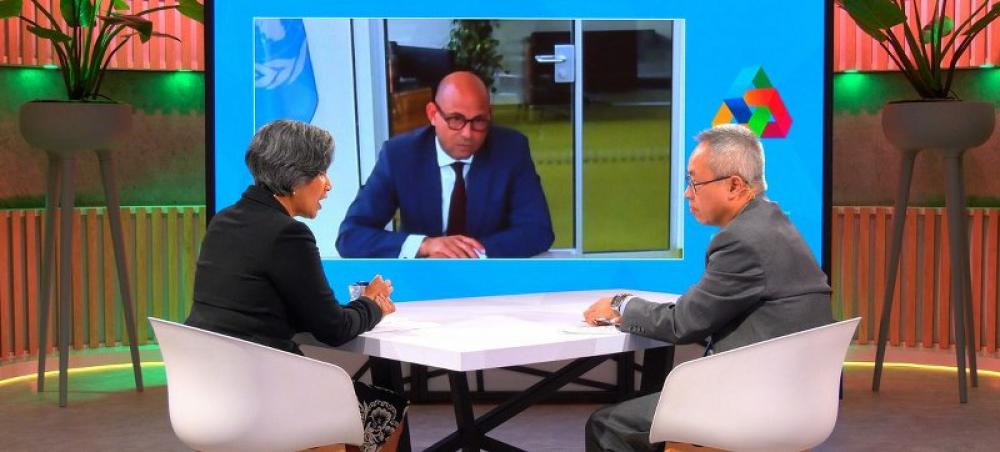Just Earth News | @justearthnews | 15 Sep 2023

Photo Courtesy: UN TV
A new UN report delivers a strong message to world leaders heading to New York for the General Assembly’s annual high-level week: tackling the climate and sustainable development crises together will help accelerate overall progress on the 2030 Agenda.
In the first-of-its kind report launched on Wednesday, a group of independent experts use available data and evidence to outline the steps governments should take to maximize the impact of agreed policies and actions to address the worsening climate crisis and lagging achievement of the Sustainable Development Goals (SDGs).
The expert panel was set up earlier this year by the UN Department of Economic and Social Affairs (UN DESA) and the UN Climate Change secretariat (UNFCCC) to produce this comprehensive report.
Putting SDGs on track
“We must get the SDGs on track and keep the goal of 1.5 degrees alive,” said Li Junhua, the Under-Secretary-General for Economic and Social Affairs, presenting the report’s findings during an online event at the UN Headquarters.
He stressed the need for an integrated approach to strengthen synergies between these two global agendas.
The SDG Progress Report released earlier in the year highlights that only 12 per cent of the targets are on track, while over 30 per cent of the SDGs have either stalled or regressed.
Meanwhile, the Sixth Assessment Report of the IPCC, unequivocally shows that to keep the global temperature within 1.5°C limit, emissions need to be reduced by at least 43 per cent by 2030 compared to 2019 levels.
The Executive Secretary of UNFCCC, Simon Stiell, echoed Mr. Li’s sentiment, stating: “Achieving the Sustainable Development Goals and stabilizing our climate to build resilient societies are two sides of the same endeavor.”
Tandem ride
There are obvious synergies when addressing climate change and achieving the SDGs at once, the report says. If run in tandem, the 2030 Agenda and the Paris Agreement processes can have positive influence on each other, boosting the advancement of both objectives.
For example, bringing universal electricity access to sub-Saharan Africa by 2030 (SDG 7) would require an annual investment of $27 billion under existing climate policies, compared to an additional $6 billion without such policies. Stringent air pollution control and greenhouse gas mitigation measures can reduce unhealthy particulate matter levels for 40 per cent of the global population, particularly benefiting India, China, and the Middle East.
Lingering barriers
At the same time, the report identifies key barriers to achieving more synergistic actions, such as knowledge gaps, political and institutional barriers, and economic disruptions. Greater institutional coordination and policy coherence at the national level is a must, it reads.
The synergies are highly dependent on national priorities and contexts, with low-income and lower-middle-income countries experiencing more pronounced interlinkages between SDG and climate action.
Its authors suggest that country commitments and reporting mechanisms, such as Nationally Determined Contributions (NDCs) under the Paris Agreement and Voluntary National Reviews (VNRs) under Agenda 2030, should incorporate synergistic targets and co-benefits.
Currently, only 23 out of 173 NDCs explicitly mention SDGs, despite their significant impact on regional and global SDG achievement.
The finance gaps in both climate and development action – potholes on the road to progress that can largely be attributed to antiquated and unequal global financial architecture – should also be taken into consideration. The roadmap recommends measures to encourage international financial institutions to introduce instruments that enhance climate and development synergies.